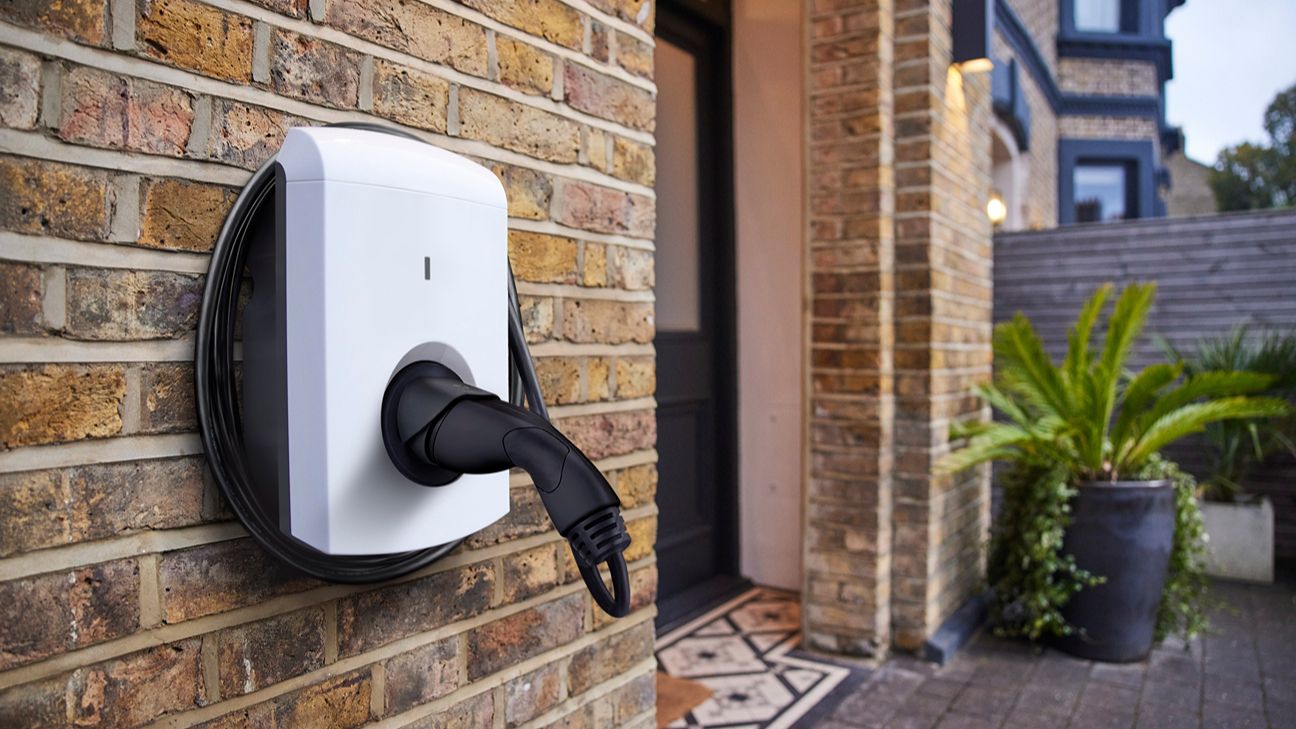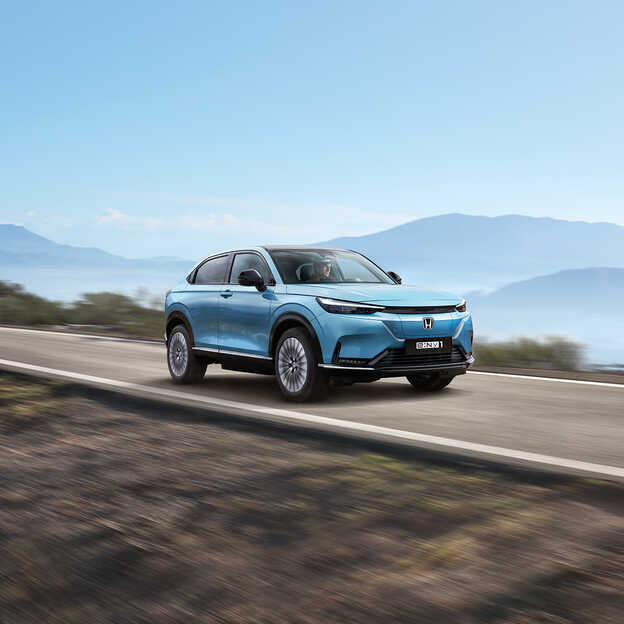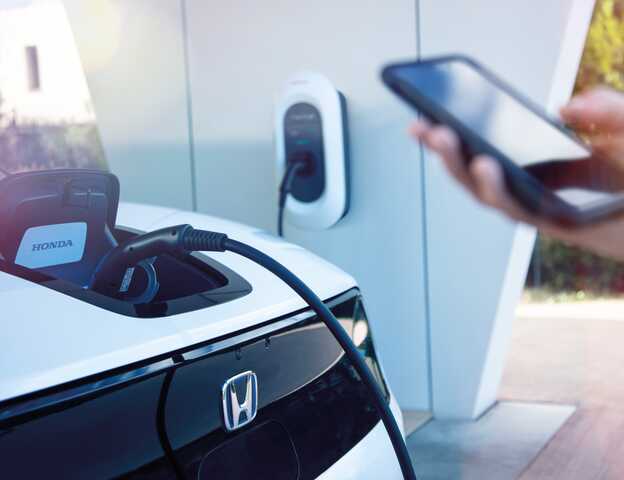Electric car charging at home
Electric car charging at home is simple and convenient. Whether you're using a standard wall socket or installing a dedicated EV charger, this guide walks you through everything you need to know.
Let’s explore how you can make the most of home charging for your Honda electric vehicle.
Can you charge an electric car at home?
Before you can charge an electric car at home, you need to think about which method is best for you.

Dedicated EV charger
Electric car charging points via a dedicated EV charger at home offer faster charging, though they should be professionally installed to ensure safety and reliability.
Dedicated EV chargers can also include advanced features such as power consumption monitoring and charge scheduling, helping to optimise energy use and reduce your electricity bills.
Standard wall socket
You can use a traditional, 3-pin, weatherproofed wall socket plug and charge your vehicle from your mains. This is cheaper than installing dedicated home chargers for electric cars, but it takes longer to charge your vehicle. EVSE charging cables are easy to use via the mains, but you’ll need to take care when handling them. They work well as a backup but may not be as desirable for day-to-day use.


Charging your e:Ny1
An intelligent charging solution that connects your e:Ny1 with any charger and tariff. Managed in an intuitively smart app, this service helps optimise charging based on your energy tariff and schedule, helping to reduce costs and potentially use lower-carbon electricity.
How much does it cost to install an electric car charger at home?
There are a few things to consider if you’re installing car charging points at home, as they can’t fit just anywhere or be installed by just anyone. You must:
- Find a suitable exterior charge point on your property. Look for somewhere close to where you normally park.
- Contact a recommended charging point installer to safely connect the system.
- Safely connect the electric vehicle home charging points to the main electric supply.
Cost of installing an electric car home charger
The cost of installing a home charger for an electric car varies depending on the installer, the type of charger, and any additional electrical work required. In the UK, the average installation cost typically ranges from £800 to £1,400, though prices may differ depending on local labour rates and available government incentives.
Electric vehicle charger grants and incentives
Depending on your location, government grants for electric car charging points in your home could partially cover the cost of charger installation. While these can vary, the UK Government’s website (gov.uk) contains details of grants such as the EV chargepoint grant for homeowners, renters, and landlords
.jpg)
How long does it take to charge an electric car at home?
Electric vehicle home charging points can vary in charge time due to their power output, as well as the size of your EV’s battery. Generally, compared to public charge points, charging your electric car at home will be slower because the chargers aren’t as powerful. Most EV owners charge their vehicles overnight, so they have a full battery the next day.
Typically, the average electric car runs with a 60kWh battery, so a 7kW charging point would take around eight hours to fully charge your vehicle. However, a public charge point could generate as much as 50kW, charging your vehicle in minutes. So, even if you’re on the road for a long time, you won’t be making overnight pit stops.
Can I speed up charging my electric car at home?
It’s possible to speed up your electric car charging at home, and most installers will offer a range of charge point speeds depending on your needs. So, if you’re currently operating with a 3.7kW charging point, you could consider a 7kW or even higher.
However, you should be aware of your vehicle’s innate charging time, as some have their charge rates artificially set to prolong and protect the battery life. Each vehicle has its own set charge times, so check with the manufacturer before you make any purchases. Also, while high-power charging points are available, many homes may not be able to support such high voltage on their native electrical supply.
FAQs
Can you plug a car into a regular outlet?
Yes, electric car charging at home can be done by connecting the charger to a regular, 3-pin wall socket plug. However, charging this way can be much slower than a dedicated charging unit, so it’s best used as a backup unless you are an infrequent driver.
Should I charge my EV every night?
The quick answer to this is no, you don’t need to charge your EV every night. If you get into the habit of leaving it on charge every night, you can shorten/degrade the lifespan of the car’s battery pack. Just like a phone battery, you don’t want to let it sit at 100% capacity with the charger in for too long. Therefore, it can be better to avoid charging while you’re asleep. Every battery is different, so check your car's user manual for the best advice and recommendations on battery charging.
Can you sit in an electric car while it’s charging?
Yes, there’s no immediate risk to the average person if they want to sit in an EV while it’s connected to a charge point. However, it’s advised that people with pacemakers don’t because the charging may disrupt their devices.
How much does it cost to charge an electric car at home?
Charging an electric car at home is usually cheaper than using a public charger. On average, fully charging a 60 kWh battery typically costs around £15–£20 at average UK electricity rates (around 25–30p per kWh). Charging during off-peak hours can help lower electricity costs, as many energy providers offer reduced tariffs overnight.
Can you charge an electric car in the rain?
Yes - electric cars and their charging points have been designed to be weatherproof, so you can charge your electric car in the rain. Cables and chargers meet stringent modern safety standards for outdoor use, meaning you can safely recharge even in wet weather conditions.
Are charging stations for electric cars free?
There are some free charging stations for electric cars, although you will have to pay for most. Certain retailers offer free public charging points for customers, so look for stores that offer this service. Charging at home is most often the cheapest option.
Related reading
Honda Electric Range Overview.jpg/_jcr_content/renditions/c2_r.jpg)
29.11.23
How Do Electric Cars Work?
.jpg/_jcr_content/renditions/c2_r.jpg)
29.11.23
How Do Electric Cars Work?

28.11.23
What are the advantages of electric cars?

28.11.23
Advantages and Disadvantages of Electric Cars
.jpg/_jcr_content/renditions/c2_r.jpg)
17.03.23
Are all Electric Cars Automatic?

23.02.23
Can I charge my Electric Car at home?

